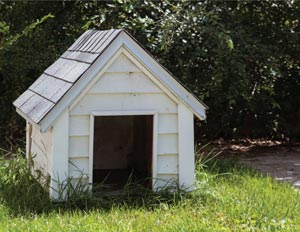AVMA addresses animal abuse, research cats and dogs, outdoor housing of pets
 The AVMA Board of Directors, while meeting April 11-13, revised guidance for veterinarians on responding to animal abuse or neglect, approved a policy supporting best practices in the adoption of research cats and dogs, and expanded guidelines for responsible pet ownership to address outdoor housing.
The AVMA Board of Directors, while meeting April 11-13, revised guidance for veterinarians on responding to animal abuse or neglect, approved a policy supporting best practices in the adoption of research cats and dogs, and expanded guidelines for responsible pet ownership to address outdoor housing.
Animal abuse
The previous version of the AVMA policy "Animal Abuse and Animal Neglect" discussed "the responsibility of the veterinarian" to report suspected cases of abuse or neglect and to educate clients regarding humane care and treatment of animals. Dr. Lori Teller, District VIII representative on the Board, said concerns about liability factored into the revisions. The revised policy reads as follows:
"The AVMA recognizes that veterinarians may observe cases of suspected animal abuse or neglect as defined by federal or state laws, or local ordinances. The AVMA encourages state legislation providing immunity from liability in any civil, criminal, or state licensing action to any veterinarian who reports, in good faith, a suspected case of animal abuse or neglect to the proper authorities. Additionally, the AVMA encourages state legislatures to pass legislation that client/patient records related to suspected cases of animal abuse or neglect provided to proper authorities are exempt from confidentiality restrictions. Prompt disclosure of abuse is necessary to protect the health and welfare of animals and people. Veterinarians should be aware that accurate, timely record keeping and documentation of these cases are essential. The AVMA encourages veterinarians to educate clients, recognize the signs of animal abuse and neglect, and familiarize themselves with relevant laws and the appropriate authorities to whom they should report suspected cases of animal abuse or neglect within their jurisdiction."
Post-study adoption
The new AVMA policy "Research Dogs and Cats Adoption" meets a need "to support and endorse best practices in laboratory animal retirement and adoption," according to background materials from the AVMA Animal Welfare Committee. The American Society of Laboratory Animal Practitioners and American College of Laboratory Animal Medicine support the new policy. Dr. Rena Carlson, District XI representative on the AVMA Board, said the groups wanted a policy from the AVMA to help guide state legislation on adoption of research dogs and cats.
According to the policy: "The AVMA supports the adoption of healthy, post-study, research and teaching animals into long-term, private homes as companion animals through the use of adoption programs developed and managed by research institutions. The AVMA encourages research institution adoption programs because they can provide the individualized attention needed by each animal moving from a laboratory home into a private home."
The policy notes that adoption programs through research institutions typically fall under the purview of an oversight body and must comply with federal regulations or policies that protect animal welfare and health. The policy goes on to list factors to consider when developing an adoption program at a research institution and when determining the potential of individual animals for adoption.
Outdoor housing
The intent of expanding the AVMA policy "Guidelines for Responsible Pet Ownership" to address outdoor housing is "to support the engagement in welfare-focused efforts and assist in empowering animal care and control agencies to intervene in situations of outdoor housing–based neglect—without supporting or opposing any particular housing or restraint method," according to background materials from the AVMA Steering Committee on Human-Animal Interactions.
Per the revised policy: "Animals that spend extended periods of time outside require habitats that protect their health, safety, and welfare. Outdoor confinement of an animal should include provisions to minimize distress or discomfort to the animal, and assure access to appropriate food, water, and shelter from extreme weather conditions."
